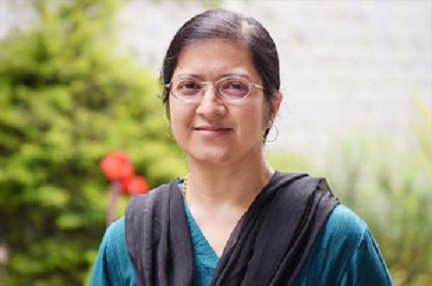Case Study: ‘A SAARC Development Fund Project on Strengthening the Livelihood Initiative for Home-Based Workers (SABAH) in the SAARC Region’—Prof. Rupa Chanda

16 April 2020, Bengaluru: The South Asian Association for Regional Cooperation (SAARC) Development Fund commissioned IIM Bangalore to write a case study on strengthening the livelihood initiative for home-based workers (SABAH) project to assess the SABAH model as a means for social development, to get insights into the approaches that work, and to draw lessons for future programs and projects in the region.
Prof. Rupa Chanda, from Economics & Social Sciences area at IIMB, undertook the case study on behalf of IIMB, which is based on an examination of project documents as well as in-depth discussions with stakeholders involved in the project across all seven SAARC countries—Afghanistan, Bangladesh, Bhutan, the Maldives, Nepal, Pakistan and Sri Lanka.
SABAH in the SAARC Region is a flagship regional project funded by the SAARC Development Fund SD under its Social Window. The project was conceptualized in collaboration with the Self-Employed Women’s Association (SEWA) and Home Net South Asia (HNSA). The project has been implemented in two phases in all SAARC countries.
The project that started in August 2008 has resulted in the creation of the SAARC Business Association of Home-Based Workers, SABAH, a social business organization, in each of the implementing countries. The project’s main objective has been to increase the employability and income of Home-Based Workers (HBWs) in the region in the attainment of SAARC’s ultimate goals of promoting the welfare and improving the quality of life of the people and accelerating economic growth and social progress. These objectives were envisaged to be achieved through a variety of activities which focus on building the capacity of marginalized HBWs, increasing the range of products they can produce, and linking them to the local, regional, and international markets.
This Case Study by IIMB provides a comprehensive analysis of (a) the key features of the project; (b) the issues and challenges affecting its execution in each implementing country; (c) its impact at the regional level in terms of fostering regional integration, cooperation, trade, connectivity and value chains, and sharing of best practices; and (d) its impact at the national level in terms of empowering women, building their skill sets and entrepreneurial capacity, creating value chains and other linkages with the local economy, developing new products, and generating wider externalities.
As part of the knowledge management activities, the report has been circulated to relevant stakeholders including Business Schools, Development Partners, Multilateral Development Banks (MDBs), International Financial Institutions (IFIs), Donor Agencies, and Government Agencies engaged in social empowerment, entrepreneurship and social development-related work.
The SAARC Development Fund aims to make this Case Study a part of MBA courses at Business Schools in the region.
Case Study: ‘A SAARC Development Fund Project on Strengthening the Livelihood Initiative for Home-Based Workers (SABAH) in the SAARC Region’—Prof. Rupa Chanda
16 April 2020, Bengaluru: The South Asian Association for Regional Cooperation (SAARC) Development Fund commissioned IIM Bangalore to write a case study on strengthening the livelihood initiative for home-based workers (SABAH) project to assess the SABAH model as a means for social development, to get insights into the approaches that work, and to draw lessons for future programs and projects in the region.
Prof. Rupa Chanda, from Economics & Social Sciences area at IIMB, undertook the case study on behalf of IIMB, which is based on an examination of project documents as well as in-depth discussions with stakeholders involved in the project across all seven SAARC countries—Afghanistan, Bangladesh, Bhutan, the Maldives, Nepal, Pakistan and Sri Lanka.
SABAH in the SAARC Region is a flagship regional project funded by the SAARC Development Fund SD under its Social Window. The project was conceptualized in collaboration with the Self-Employed Women’s Association (SEWA) and Home Net South Asia (HNSA). The project has been implemented in two phases in all SAARC countries.
The project that started in August 2008 has resulted in the creation of the SAARC Business Association of Home-Based Workers, SABAH, a social business organization, in each of the implementing countries. The project’s main objective has been to increase the employability and income of Home-Based Workers (HBWs) in the region in the attainment of SAARC’s ultimate goals of promoting the welfare and improving the quality of life of the people and accelerating economic growth and social progress. These objectives were envisaged to be achieved through a variety of activities which focus on building the capacity of marginalized HBWs, increasing the range of products they can produce, and linking them to the local, regional, and international markets.
This Case Study by IIMB provides a comprehensive analysis of (a) the key features of the project; (b) the issues and challenges affecting its execution in each implementing country; (c) its impact at the regional level in terms of fostering regional integration, cooperation, trade, connectivity and value chains, and sharing of best practices; and (d) its impact at the national level in terms of empowering women, building their skill sets and entrepreneurial capacity, creating value chains and other linkages with the local economy, developing new products, and generating wider externalities.
As part of the knowledge management activities, the report has been circulated to relevant stakeholders including Business Schools, Development Partners, Multilateral Development Banks (MDBs), International Financial Institutions (IFIs), Donor Agencies, and Government Agencies engaged in social empowerment, entrepreneurship and social development-related work.
The SAARC Development Fund aims to make this Case Study a part of MBA courses at Business Schools in the region.
